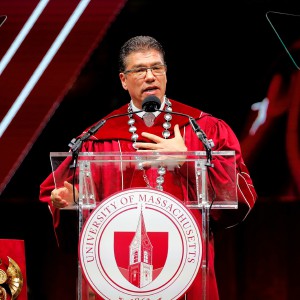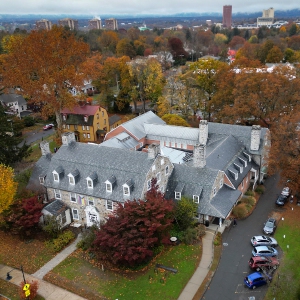Amherst officials cool to bid to double spending hike for regional schools

Amherst Town Council members Mandi Jo Hanneke, left, and Lynn Griesemertown take part in a ribbon-cutting for the Kendrick Park playground on Aug. 24, 2021. STAFF FILE PHOTO
| Published: 04-11-2024 6:33 PM |
AMHERST — A request for nearly $1 million more from the four member towns of the Amherst-Pelham Regional School District to support a $35.75 million fiscal year 2025 budget for the regional schools is being met with a lukewarm response and skepticism from Amherst officials.
With little appetite apparent for dipping into reserves to add what would be Amherst’s share of the extra funding $746,400 more to the regional schools operating budget at a Budget Coordinating Group meeting on Friday, At Large Councilor Mandi Jo Hanneke said officials would instead have to see if other parts of the municipal budget, including town and library services and the elementary schools, could be cut.
As it stands, each component of the budget — the town, library, regional and elementary schools — are supposed to get 4% increases over fiscal year 2024 spending. But the Regional School Committee is asking for an 8.2% increase in Amherst’s assessment, or $1.46 million, well above the $710,881 increase recommended under the 4% cap.
Those financial guidelines were provided by Amherst officials last fall and have been the basis of the spending discussed at four town meetings involving Amherst, Shutesbury, Leverett and Pelham officials.
With the 4% increase, 15 educator positions would be lost. School Committee members and residents have both expressed alarm that among the cuts would be world languages at the middle school and the restorative justice coordinators at both the middle and high schools.
Hanneke said those involved with the regional schools have understood that a fiscal cliff was looming.
“It doesn’t appear from my vantage point as a councilor that plans were made,” Hanneke said. “They seem to be one-year reactions.
“I fear there’s not a willingness to look at the expense side of planning,” Hanneke said.
Article continues after...
Yesterday's Most Read Articles
 Granby Bow and Gun Club says stray bullets that hit homes in Belchertown did not come from its range
Granby Bow and Gun Club says stray bullets that hit homes in Belchertown did not come from its range
 Super defers Amherst middle school principal pick to successor; one finalist says decision is retaliation for lawsuit
Super defers Amherst middle school principal pick to successor; one finalist says decision is retaliation for lawsuit
 Political newcomer defeats Shores Ness for Deerfield Selectboard seat
Political newcomer defeats Shores Ness for Deerfield Selectboard seat
 ‘Home away from home’: North Amherst Library officially dedicated, as anonymous donor of $1.7M revealed
‘Home away from home’: North Amherst Library officially dedicated, as anonymous donor of $1.7M revealed
 Town manager’s plan shorts Amherst Regional Schools’ budget
Town manager’s plan shorts Amherst Regional Schools’ budget
 Annette Pfannebecker: Vote yes for Shores Ness and for Deerfield
Annette Pfannebecker: Vote yes for Shores Ness and for Deerfield
The Budget Coordinating Group meeting, which brings together officials from the town, schools and library, came three days after members of the Finance Committee also expressed worry about a permanent addition to the regional school budget. The Finance Committee will hold a public hearing on the regional school request on April 25 at 5 p.m., five days after the four towns are expected to strategize on how to respond.
Town Meetings are scheduled in Leverett and Shutesbury on April 27, where those towns’ shares of the regional budget are expected to be voted on.
Amherst comptroller Holly Drake said there is not a source of additional funding for the regional schools without making drastic cuts to town operations.
“There is very little money available to make any additions and changes,” Drake said. “Reserves would be the only option, and reserves, according to our policy, are supposed to be for one-time expenses, not continued expenses and operating budgets.”
Sandy Pooler, the former finance director who is providing consulting work for the town, also cautioned against using reserves. Using that money, he said, would create a bigger problem the next year, emphasizing that continuing revenue should be used for continuing expenses.
School Committee member Bridget Hynes defended the proposed budget, adding that there’s a real feeling that the district couldn’t meet goals of preserving education in the regional schools if it passed the smaller budget.
“I think we’re looking for some way to share the pain, not to pass off the pain,” Hynes said.
Cutting educator positions would be devastating and antithetical to Amherst’s values, she said. “We can say as a town we value education — we can’t just say it, we actually have to mean it and provide it,” Hynes said.
School Committee member Irv Rhodes said he voted against the regional budget because he doesn’t see how the money can come from the rest of the town spending, and fiscal year 2026 will be even worse, since $400,000 applied in Elementary and Secondary School Emergency Relief funds will not be available.
“I guess my pleas is the four towns come together to deal with the structural issue and the the town of Amherst take a closer look at how this budget affects the rest of the parts of the town,” Rhodes said.
Pooler said he is in the process of finalizing a town budget covering government, police, fire and public works, and other municipal services.
“I will say we’re not adding positions, it’s just to cover costs and so forth,” Pooler said.
He and Town Manager Paul Bockelman received over $1 million in requests from department heads for additions to the budget, and they said no to most of them. “(There’s) always more good things and justifiable things that could be done than money available,” Pooler said.
Salary costs have been the main issue for the regional schools, he said, contending that the contract reached with the Amherst Pelham Education Association — teachers, paraeducators and clerical staff — is richer than what the town can support.
“I don’t think there’s been any real reckoning for what that means,” Pooler said.
Council President Lynn Griesemer said she is concerned about the next teacher contract, and that state Chapter 70 estimates are making half the state’s school districts feel vulnerable in losing staff.
She also pointed to the town’s bill for charter school payments, mainly to both the Chinese immersion school in Hadley and the performing arts school in South Hadley, was over $2 million, more than many schools must absorb, because it is calculated based on the per-pupil spending in town.
Scott Merzbach can be reached at smerzbach@gazettenet.com.

 Sharing a few notes: High schoolers coaching younger string players one on one
Sharing a few notes: High schoolers coaching younger string players one on one Reyes takes helm of UMass flagship amid pro-Palestinian protests
Reyes takes helm of UMass flagship amid pro-Palestinian protests Sole over-budget bid could doom Jones Library expansion project
Sole over-budget bid could doom Jones Library expansion project Amherst poised to hire police department veteran as new chief
Amherst poised to hire police department veteran as new chief 